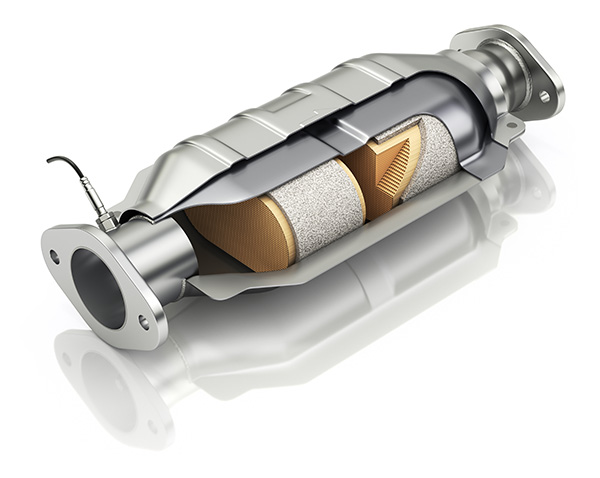
Your car’s catalytic converter reduces harmful exhaust emissions. It’s designed to convert toxic gases like carbon monoxide, hydrocarbons, and nitrogen oxides into less harmful substances before they leave your tailpipe. When the converter is functioning properly, your vehicle runs cleaner, passes emissions tests, and stays within legal pollution limits.
But if your catalytic converter starts to fail, it can trigger a host of problems. From check engine lights to sluggish engine performance and even a rotten egg smell, a bad converter affects both your emissions and how your car drives. That’s why caring for it is not only an environmental responsibility but also a way to avoid costly repairs.
What Causes a Catalytic Converter to Wear Out
Most catalytic converters are built to last for well over 100,000 miles. However, they can wear out sooner under certain conditions. The most common causes of premature failure include:
- Unburned fuel entering the exhaust, usually due to misfires or faulty oxygen sensors
- Oil or coolant leaking into the combustion chamber and contaminating the catalyst
- Physical damage from road debris or bottoming out on rough roads
- Clogged honeycomb structure from carbon buildup or chemical contamination
When the converter becomes clogged or coated with residue, exhaust flow slows down. This puts strain on the engine and increases fuel consumption.
How to Spot Early Signs of Converter Trouble
Most drivers only think about their catalytic converter when the check engine light comes on, but there are usually earlier signs that something is off. These include:
- Reduced acceleration or sluggish engine response
- Drop in fuel efficiency
- Rattling noise underneath the car, especially during startup
- Sulfur or rotten egg odor from the exhaust
- Failed emissions test
These symptoms often appear gradually, and ignoring them could lead to a complete converter failure or even damage to the engine.
Protecting the Converter Starts With Engine Maintenance
The best way to keep your catalytic converter healthy is to address problems in the engine before they affect the exhaust. Misfires, rich fuel mixtures, or oil leaks can all damage the converter if left unchecked. Regular maintenance items like spark plug replacement, air filter changes, and fuel system cleaning help prevent the conditions that shorten the life of the converter.
If your vehicle uses a turbocharged engine like many models from Audi, Mercedes-Benz, or Volkswagen, it’s especially important to keep up with oil changes and tune-ups. These engines run hotter and are more sensitive to fuel and oil contamination, which puts extra pressure on the emissions system.
Why Cheap Fuel and Additives Can Backfire
Low-quality fuel can introduce more contaminants into your exhaust system, and excessive use of fuel additives may harm the converter over time. While some additives are marketed as cleaner-burning, overusing them or choosing the wrong ones may lead to carbon buildup or chemical reactions that degrade the converter’s internal coating.
If you want to use an additive, check with a trusted technician first to ensure it's compatible with your engine and converter.
Should You Clean or Replace a Clogged Converter
There are products that claim to clean catalytic converters, but their effectiveness is limited. In most cases, if the converter is truly clogged or damaged, replacement is the only long-term solution. Attempting to clean it may only delay the inevitable and can be a waste of time and money.
That said, not every emissions-related issue is caused by the converter itself. Sometimes a bad oxygen sensor or a rich fuel mixture triggers the same symptoms. This is why a thorough diagnostic is so important before making any decisions about replacement.
Your Emissions System Deserves Expert Attention
The catalytic converter works together with oxygen sensors, the engine control unit, and your fuel system. A problem in one area can quickly affect the others. That’s why when you experience emissions trouble or performance issues, it’s best to have the entire system evaluated.
Our skilled technicians will read fault codes, inspect sensor performance, check exhaust flow, and test for contamination before recommending repairs. This kind of precision diagnostic work helps avoid misdiagnosis and unnecessary expenses.
Get Expert Catalytic Converter Care at Precision Import Repair in Hillsboro, OR
If your check engine light is on, your car is failing emissions tests, or something just feels off, schedule a visit to Precision Import Repair in Hillsboro, OR. Our team specializes in emission system diagnostics and catalytic converter care for European and import vehicles. We’ll help you stay compliant, protect your engine, and keep your car running at its best.
Book an appointment today and keep your exhaust system healthy for the road ahead.